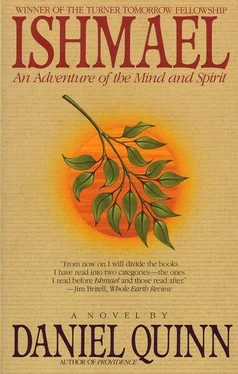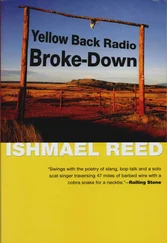1 ...8 9 10 12 13 14 ...47 “Oh, you know,” the anthropologist replied, “the fanciful tale you tell your children about the origins of the world.”
Well, at this, the creature drew itself up indignantly—at least as well as a squishy blob can do—and replied that his people had no such fanciful tale.
“You have no account of creation then?”
“Certainly we have an account of creation,” the other snapped. “But it is definitely not a myth .”
“Oh, certainly not,” the anthropologist said, remembering his training at last. “I’ll be terribly grateful if you share it with me.”
“Very well,” the creature said. “But I want you to understand that, like you, we are a strictly rational people, who accept nothing that is not based on observation, logic, and the scientific method.”
“Of course, of course,” the anthropologist agreed.
So at last the creature began its story. “The universe,” it said, “was born a long, long time ago, perhaps ten or fifteen billion years ago. Our own solar system—this star, this planet and all the others—seem to have come into being some two or three billion years ago. For a long time, nothing whatever lived here. But then, after a billion years or so, life appeared.”
“Excuse me,” the anthropologist said. “You say that life appeared. Where did that happen, according to your myth—I mean, according to your scientific account.”
The creature seemed baffled by the question and turned a pale lavender. “Do you mean in what precise spot?”
“No. I mean, did this happen on the land or in the sea?”
“Land?” the other asked. “What is land?”
“Oh, you know,” he said, waving toward the shore, “the expanse of dirt and rocks that begins over there.”
The creature turned a deeper shade of lavender and said, “I can’t imagine what you’re gibbering about. The dirt and rocks over there are simply the lip of the vast bowl that holds the sea.”
“Oh yes,” the anthropologist said, “I see what you mean. Quite. Go on.”
“Very well,” the other said. “For many millions of centuries the life of the world was merely microorganisms floating helplessly in a chemical broth. But little by little, more complex forms appeared: single–celled creatures, slimes, algae, polyps, and so on.
“But finally,” the creature said, turning quite pink with pride as he came to the climax of his story, “but finally jellyfish appeared !”
Nothing much came out of me for ninety seconds or so, except maybe waves of baffled fury. Then I said, “That’s not fair.”
“What do you mean?”
“I don’t exactly know what I mean. You’ve made some sort of point, but I don’t know what it is.”
“You don’t?”
“No, I don’t.”
“What did the jellyfish mean when it said ‘But finally jellyfish appeared’?”
“It meant… that is what it was all leading up to. This is what the whole ten or fifteen billion years of creation were leading up to: jellyfish.”
“I agree. And why doesn’t your account of creation end with the appearance of jellyfish?”
I suppose I tittered. “Because there was more to come beyond jellyfish.”
“That’s right. Creation didn’t end with jellyfish. Still to come were the vertebrates and the amphibians and the reptiles and the mammals, and of course, finally, man.”
“Right.”
“And so your account of creation ends, ‘And finally man appeared.’ ”
“Yes.”
“Meaning what?”
“Meaning that there was no more to come. Meaning that creation had come to an end.”
“This is what it was all leading up to.”
“Yes.”
“Of course. Everyone in your culture knows this. The pinnacle was reached in man. Man is the climax of the whole cosmic drama of creation.”
“Yes.”
“When man finally appeared, creation came to an end, because its objective had been reached. There was nothing left to create.”
“That seems to be the unspoken assumption.”
“It’s certainly not always unspoken. The religions of your culture aren’t reticent about it. Man is the end product of creation. Man is the creature for whom all the rest was made: this world, this solar system, this galaxy, the universe itself.”
“True.”
“Everyone in your culture knows that the world wasn’t created for jellyfish or salmon or iguanas or gorillas. It was created for man.”
“That’s right.”
Ishmael fixed me with a sardonic eye. “And this is not mythology?”
“Well… the facts are facts.”
“Certainly. Facts are facts, even when they’re embodied in mythology. But what about the rest? Did the entire cosmic process of creation come to an end three million years ago, right here on this little planet, with the appearance of man?”
“No.”
“Did even the planetary process of creation come to an end three million years ago with the appearance of man? Did evolution come to a screeching halt just because man had arrived?”
“No, of course not.”
“Then why did you tell it that way?”
“I guess I told it that way, because that’s the way it’s told.”
“That’s the way it’s told among the Takers. It’s certainly not the only way it can be told.”
“Okay, I see that now. How would you tell it?”
He nodded toward the world outside his window. “Do you see the slightest evidence anywhere in the universe that creation came to an end with the birth of man? Do you see the slightest evidence anywhere out there that man was the climax toward which creation had been straining from the beginning?”
“No. I can’t even imagine what such evidence would look like.”
“That should be obvious. If the astrophysicists could report that the fundamental creative processes of the universe came to a halt five billion years ago, when our solar system made its appearance, that would offer at least some support for these notions.”
“Yes, I see what you mean.”
“Or if the biologists and paleontologists could report that speciation came to a halt three million years ago, this too would be suggestive.”
“Yes.”
“But you know that neither of these things happened in fact. Very far from it. The universe went on as before, the planet went on as before. Man’s appearance caused no more stir than the appearance of jellyfish.”
“Very true.”
Ishmael gestured toward the tape recorder. “So what are we to make of that story you told?”
I bared my teeth in a rueful grin. “It’s a myth. Incredibly enough, it’s a myth.”
“I told you yesterday that the story the people of your culture are enacting is about the meaning of the world, about divine intentions in the world, and about human destiny.”
“Yes.”
“And according to this first part of the story, what is the meaning of the world?”
I thought about that for a moment. “I don’t quite see how it explains the meaning of the world.”
“Along about the middle of your story, the focus of attention shifted from the universe at large to this one planet. Why?”
“Because this one planet was destined to be the birthplace of man.”
“Of course. As you tell it, the birth of man was a central event—indeed the central event—in the history of the cosmos itself. From the birth of man on, the rest of the universe ceases to be of interest, ceases to participate in the unfolding drama. For this, the earth alone is sufficient; it is the birthplace and home of man, and that’s its meaning. The Takers regard the world as a sort of human life–support system, as a machine designed to produce and sustain human life.”
Читать дальше
Конец ознакомительного отрывка
Купить книгу












